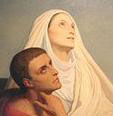Augustine of Hippo
Augustine of Hippo (354-430), also known as St. Augustine, was Bishop of Hippo Regius (present-day Annaba, Algeria). He was a Latin-speaking philosopher and theologian who writings were very influential in the development of Western Christianity. He believed that the grace of Christ was indispensable to human freedom, and he framed the concepts of original sin and just war. When the Western Roman Empire was starting to disintegrate, Augustine developed the concept of the Catholic Church as a spiritual ‘City of God’. His thoughts profoundly influenced the medieval worldview. Augustine's City of God was closely identified with the Church, the community that worshipped God. In the summer of 386, after having heard a the story of Placianus about his and his friends' first reading of the life of Saint Anthony of the Desert, Augustine underwent a profound personal crisis, leading him to convert to Christianity, abandon his career in rhetoric, quit his teaching position in Milan, give up any ideas of marriage, and devote himself entirely to serving God and to the practices of priesthood, which included celibacy. According to Augustine his conversion was prompted by a childlike voice he heard telling him "tolle, lege" ("take up and read"). Other Side of the
Story z |
